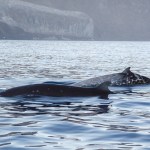Campaign Announcement – Operation Divina Guadalupe
Published by Sea Shepherd Conservation Society

Sea Shepherd embarks on the seventh season of its longest-running research campaign, providing novel insights into the behavior and movement patterns of Cuvier’s beaked whales.
ENSENADA, BC, Mexico – Sept. 14, 2020 – Sea Shepherd’s research vessel, Martin Sheen, has departed for Guadalupe Island, marking the launch of Operation Divina Guadalupe. This long-term research collaboration focuses on the study of one of the most elusive species of marine mammals – the Cuvier’s beaked whale.
Working with renowned scientist Gustavo Cardenas and his team from CONANP, Mexico’s National Commission for the Protection of Natural Areas, Operation Divina Guadalupe provides support to world-leading researchers as they study the cetaceans present in the waters surrounding Guadalupe Island. Enhancing scientific knowledge about Cuvier’s beaked whales and the other species found in this area allows greater protective measures to be put in place to ensure their long-term survival.
Guadalupe Island is a volcanic island located 150 miles off the western coast of Mexico. It serves as a critical habitat for many marine species, including Cuvier’s beaked whales, white sharks, bottlenose dolphins, northern elephant seals, and Guadalupe fur seals. In 2005, Guadalupe Island was designated a Biosphere Reserve, providing protections for the animals that inhabit the area.


Cuvier’s beaked whales exist in oceans around the world, but sightings are rare, making this species particularly challenging to study. The high frequency of sightings in the waters of Guadalupe Island makes this area an important location for research into this elusive species.
Sea Shepherd’s Operation Divina Guadalupe has the largest number of worldwide sightings of Cuvier’s beaked whales ever recorded an is one of the only long-term studies of beaked whales in existence.
“Operation Divina Guadalupe is a great example of research and conservation combining forces with very positive results,” said Eva Hidalgo, Science Coordinator for Sea Shepherd Conservation Society. “The more we learn about this species and marine ecosystem, the better we can protect them.”
Cuvier’s beaked whales are particularly susceptible to human-made acoustic disturbances, including seismic activity and naval sonar. These disturbances can lead to mass strandings. Earlier studies have resulted in the creation of several sonar-free and sonar-regulated zones in oceans around the world, but further research is needed to ensure their safety throughout their life cycles and geographical range.
“Cuvier’s beaked whales are the world’s deepest divers, reaching depths more than six times the height of the Empire State Building,” said Peter Hammarstedt, Director of Campaigns for Sea Shepherd. “What makes them unique also makes them hard to find, which is why Sea Shepherd provides scientists with a floating research platform in the heart of Cuvier’s beaked whale activity.”
By supporting scientists as they study the animals and ecosystems of Guadalupe Island, Sea Shepherd is contributing to the body of scientific work needed to shape policy and enhance protections.
—
This research is a collaboration between Sea Shepherd Conservation Society and Comisión de Áreas Naturales Protegidas and is carried out under agreement number: CONP/RPBCPN/CONVENIOS/002/2020
Read the full article at: https://seashepherd.org/2020/09/14/campaign-announcement-operation-divina-guadalupe/?utm_source=rss&utm_medium=rss&utm_campaign=campaign-announcement-operation-divina-guadalupe



